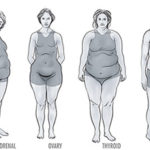
An interesting survey published in Business Insider some time showed that being an administrative assistant, an engineer or a teacher, nurse practitioner or IT manager increases the risk of gaining weight, more 50% of people occupying such functions saying that they consider themselves overweight.
Indeed, having a sedentary job can make one more prone to gaining unnecessary pounds, but there are a couple of strategies you can adopt in order to stay fit and healthy despite working at a desk all day. We’ll discuss these solutions immediately, but first we’ll take a look at the most common reasons you’re gaining weight with an office job.
The human body was not built to sit in a chair all day long. It was created to move around and work against gravity, but when you spend several hours at your desk, you deprive your body from the beneficial action of gravity. It’s been shown that sedentariness slows down the metabolic rate, which is a measure of how efficiently the organism uses its energy reserves (nutrients coming from food), and a decreased metabolic rate means an increased risk of packing on pounds.
Then, sitting for prolonged periods of time makes your muscles weaker and contributes to muscle mass loss. At the same time, sitting seems to turn off the protective mechanisms that keep chronic diseases away, therefore the longer you sit, the higher the risk of cardiovascular disease, diabetes type 2, metabolic syndrome and other such conditions becomes.
Above all these, scientists say that sitting less than 2 hours a day is associated with an increase in life expectancy of 1.38 years; in other words, sitting for more than 2 hours per day not only makes you gain weight but also decreases your life expectancy.
To prevent the accumulation of pounds as a result of prolonged sitting, try to stand more, to move more and to take advantage of any opportunity to do some physical activity. If your office has a gym, 30 minutes of cardio or strength exercises are enough for burning some calories and speeding up the metabolic rate.
If you’ve recently switched to an office job and you’ve noticed that your clothes are suddenly a little tighter than before, it’s probably because you’re moving less or eating more than you used to do. Sedentary jobs are often boring and make one more prone to snacking, and given that office vending machines aren’t packed with broccoli and lean chicken cuts, it’s very common for workers to gain weight due to office snacking.
Office kitchens that are always stocked with cookies, crackers and pastries are tempting no matter how strong your will power and how healthy your lifestyle is, so the best you can do is avoid snacking on high-calorie products. Instead, bring your own meal casseroles at the office and try to limit the eating moments to the lunch break, as this will prevent overeating.
Finally, stress at work is one of the common triggers of weight gain. Stress increases the production of cortisol, which favors the accumulation of fats especially around the waist, and this destroys your silhouette and makes you more prone to ailments. Working for too many hours often makes one skip workouts and favors depression, fatigue, overeating and unhealthy lifestyle habits.
For this reason it’s recommended to take advantage of the lunch break and have a healthy, balanced meal away of your desk. Try not to think of your work projects during the break and move as much as possible. A couple of stretches or 20 minutes of brisk walking coupled with a meal that is rich in protein, complex carbs and good fats can keep your body well-fed and energized, can counteract the negative effect of sitting on your muscles and can release the work-related stress.
According to Australian researchers, sitting more than 6 hours per day doubles the risk of becoming overweight. To reduce this risk, stay hydrated, take walks as often as possible, eat a healthy lunch and pay attention to portion sizes, and finally, snack on fruits and veggies instead of cookies and other junk products.
Have something to add to this article? Comment below or join our Facebook community and share your thoughts with us!

Updated on: 08.09.2021 The lymphatic system is involved not only...

Stress can make you gain weight – we’ve heard this...

Various theories exist to answer this question. As you will...

Our series of whole body vibration machine exercise articles continues...

Both rebounding and jumping on a trampoline are excellent ways...